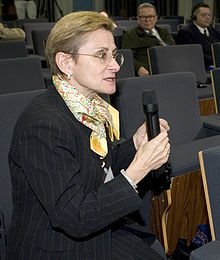French academic, historian From Wikipedia, the free encyclopedia
Annie Lacroix-Riz[1] (born 1947) is a French academic Marxist historian specializing in France's relations with Germany and the United States from the 1930s to the 1950s, as well as World War II collaboration.
Annie Lacroix-Riz | |
|---|---|
 Annie Lacroix-Riz in 2005 | |
| Born | 1947 |
| Citizenship | French |
| Occupation | Historian |
| Academic background | |
| Education | École normale supérieure de jeunes filles Paris 1 Panthéon-Sorbonne University |
| Academic work | |
| Institutions | Paris Diderot University |
A former student of the École normale supérieure de jeunes filles and a pupil of Pierre Vilar, she is a professor emeritus of contemporary history at the Paris Diderot University, now part of Paris Cité University.
Lacroix-Riz is a founding member of the Pole of Communist Revival in France (PRCF), established in 2004.
Her interests are the political, economic and social history of the French Third Republic and Vichy Government,[2][3][4] the relations between the Vatican and the Reich [5][6][7] as well as the strategies of the French elites before and after the Second World War.[8][9][10]
In her early works examining post-war reconstruction of France, Lacroix-Riz studied labor union tensions, investigating issues within the General Confederation of Labour (French: Confédération Générale du Travail, CGT),[11][12] the role of French minister Ambroise Croizat on social labor reforms,[13] and American trade unionist Irving Brown’s role in France. Subsequent works further probe American influence in Europe (for example in Sweden)[14] and in the French colonies of North Africa[15][16] and put into question the motives of the Marshall Plan.[17][18][19][20][21] One of her primary theses is that profit-driven complicity of French industrial and financial institutions with Nazi Germany contributed to France's 1940 defeat,[22][23][24][25][26][27]paving the path to U.S ascendancy in Europe.[24][17]
Lacroix-Riz’s writings on the 1930s and WWII, particularly regarding financial and industrial interests, terrorist group La Cagoule, her views on Synarchism and Holodomor[28] have sparked mixed critical responses. On one hand, she is recognized for the detailed and comprehensive nature of her work, rooted in archival evidence.[2][26][4] On the other hand, her work faces criticism of potential anti-capitalist bias, since she challenges traditional perspectives and conventional narratives.[29][4][30]
Seamless Wikipedia browsing. On steroids.